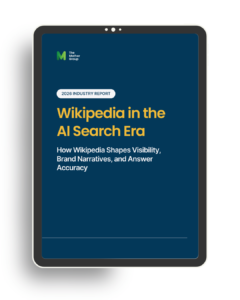It’s AI-time. Artificial intelligence-inspired answers are taking over the internet in a quickly growing trend with serious staying power. When it comes to (almost) everyone’s go-to search engine, Google’s Gemini-powered AI Overviews appear in a growing percentage of search results. They’re triggered by informational, long-tail queries and often take over prime real estate at the top of the page.
For brands focused on growing awareness, recognition, and invested fans, this presents a shift: Ranking organically is no longer enough. You need to be cited – by name – in the Overview itself to cover all your internet traffic bases.
Let’s break down how to make that happen.
Table of Contents
Proven Tactics for AI Overview Visibility

The AI-game is still rapidly changing, but it’s been here long enough we’re beginning to see some patterns. Here are some of our takeaway tactics, established after months of gathering SEO and GEO data for our clients.
1. Rank in the Top 10 First
Pages that already rank on page one are much more likely to be pulled into AI Overviews. So outstanding content, strong technical SEO, and on-page structure still lay the foundation for success.
In other words, if your site isn’t optimized for visitors, or if your content game is abysmal, you aren’t going to rank anywhere on Google, AI Overview or otherwise. Perfect these basics, keep them integrated into all SEO plans, and you will go far.
2. Prioritize Clear, Scannable Answers
Human visitors and AI tools share a love for easily readable content. If you want to be featured in AI Overviews, you need to:
- Create content matching the same informational, long-tail queries searchers are using. This can be long-form, such as blogs, or short-form, such as FAQs.
- Create comprehensive content clusters that address expected follow-on questions.
- Organize all content with clearly-labeled sections using headings and subheadings.
- Start each clearly-labeled section with a 2–3 sentence answer that is succinct and helpful.
- Use bullets and short paragraphs to make content quickly scannable.
Want help structuring your content for AI Overviews? We can help.
3. Utilize Multiple Content Types
Not everyone wants answers the same way. To best meet different learning styles and preferences, create various content types such as blogs, videos, and infographics.
Don’t try to reinvent the wheel each time. If you have a stellar blog, repurpose it into a video, and vice versa.

4. Apply Strong Schema & Structured Data
Structured data has been prioritized by Google for a long time. It makes it easier for the search engine to understand a page, and the same holds true for the new AI Overviews.
Use FAQPage and HowTo schema, structured headings, alt text, and clear markup to help AI systems parse and interpret your content.
5. Optimize for UX & Technical Readiness
AI doesn’t just read — it evaluates quality signals, too. Fast page load, mobile responsiveness, crawlability, and an intuitive structure all matter.
(Remember that they matter for your all important human visitors, too. If your website doesn’t provide a good, user-friendly experience, you can bet visitors won’t hang around or return. And a quick bounce rate tells Google there’s no reason to feature your site.)
6. Refresh Content & Monitor Overviews
Rinse and repeat. As with all things SEO and GEO, the work is never done.
- Keep high-performing content up to date.
- Resubmit updated pages to Google Search Console (GSC).
- Constantly track what triggers AI Overviews using tools like Semrush and Contently.
Pro Tip: Onsite Gets You Seen — Offsite Gets You Cited

Everything above? That’s onsite optimization — getting your content ready for AI.
But to consistently appear in AI Overviews, you also need to earn trust from the wider web. This is partly where Google’s E-E-A-T comes into play.
Build Experience, Expertise, Authority & Trust (E-E-A-T)
Google uses its E-E-A-T concept to evaluate information. If you want to self-assess the likelihood of your content ranking on page one and in Overviews, use this criteria.
- Experience: Have you personally used the product, service, or strategy you write about? How apparent is that to others?
- Expertise: What is your background on the topic? Why should people listen to you?
- Authoritativeness: Are you and your brand recognized as an authority in your field?
- Trustworthiness: Is your content factual?
A few tips for boosting your E-E-A-T score:
- Include author bios with credentials as relevant. This usually means on an “About Us” page on your website as well as in content pieces such as bylines and blog posts.
- Include a boilerplate at the bottom of content pieces that clearly tells AI tools who your company is and what you do.
- Build up a rich network of authoritative mentions across the web. You need to be seen as an expert in your field by the people whose opinions matter. When high-ranked, authoritative sites include you alongside your topic of expertise, it tells AI Overviews that you matter in your space.
- Keep content trustworthy, original, and reader-centric. This will encourage backlinks and social media shares.
Utilize the powerful levers of Wikipedia and Reddit. Both these sites are key, foundational sources for AI platforms, and feature heavily on Google’s first page. Each one requires a different strategy, but including them in an SEO and GEO plan is paramount for success. Ignore them at your peril. They can shape how your brand is represented across AI Overviews – not just whether you show up, but how you’re described.
Summary Table: AI Visibility Checklist
What to Prioritize | What to Do |
Core SEO | Improve page ranking, load speed, crawlability |
Structured Answers | Focus on short intros per section, headings and subheadings, bullet points, FAQs |
Multiple Content Types | Create blogs, videos, infographics |
Schema | Apply elements such as FAQ, HowTo, alt-text |
Freshness | Update content regularly and resubmit to GSC |
Monitoring | Use tools such as Semrush and Contently for AI Overview tracking |
Offsite Authority and E-E-A-T | Include bios with credentials and boilerplate; focus on backlinks, Wikipedia, and Reddit |
Make it Yours
AI Overviews aren’t a passing fad — they’re a tectonic shift in how people discover and evaluate information. Want to use them to shape brand visibility? Onsite content optimization gets you in the game. Offsite authority makes you a trusted voice.
Want help with either side? That’s exactly what we do. Connect with us today.
The Mather Group LLC is a digital marketing agency. We specialize in enhancing online reputations through authentic content and expert digital brand management. Clients trust us with Wikipedia, GEO & SEO, LLM optimization, search reputation and more . Don’t like how you’re showing up online? Let’s talk.



